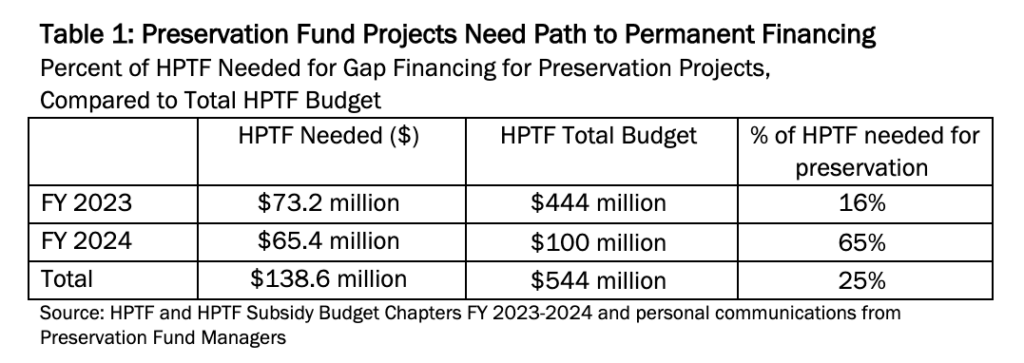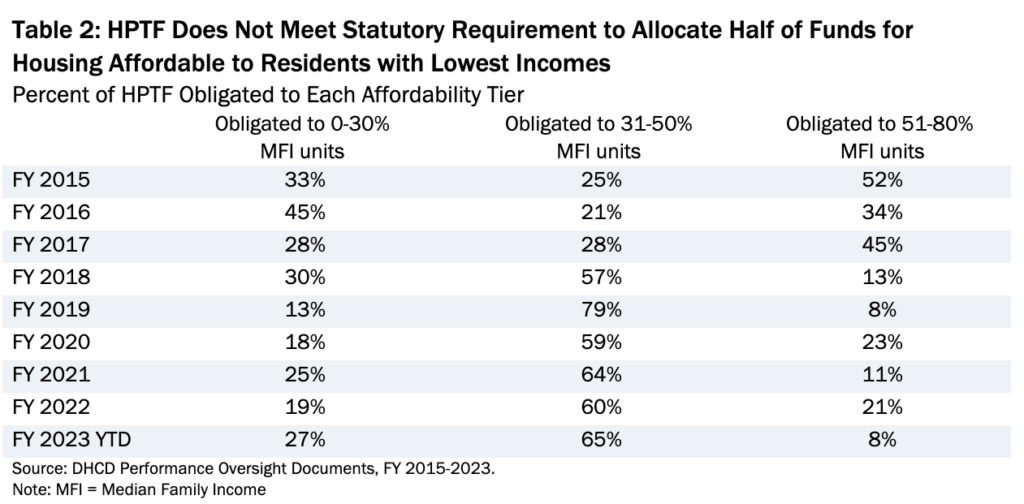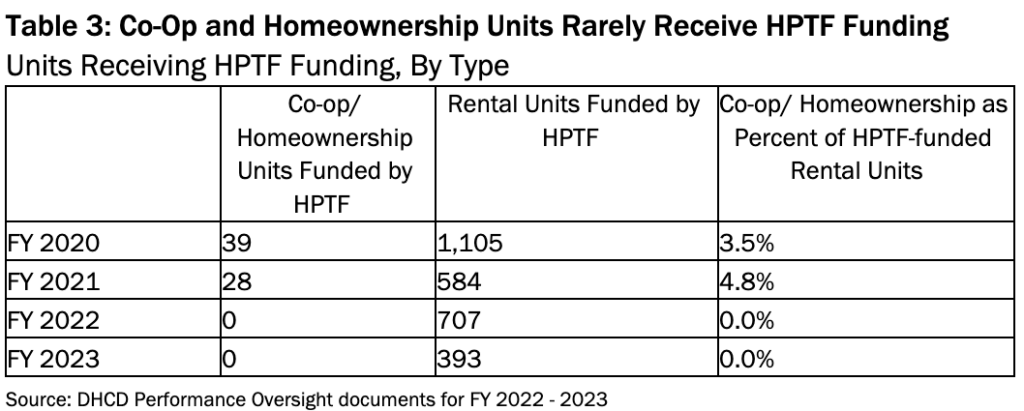Good morning, Chairperson White and members of the Committee. Thank you for the opportunity to speak today. My name is Eliana Golding, and I am a senior policy analyst at the DC Fiscal Policy Institute (DCFPI). DCFPI is a non-profit organization that shapes racially-just tax, budget, and policy decisions by centering Black and brown communities in our research and analysis, community partnerships, and advocacy efforts to advance an antiracist, equitable future.
Today, I will focus my testimony on the mayor’s proposed fiscal year (FY) 2024 budget for the Department of Housing and Community Development (DHCD) and the Housing Production Trust Fund (HPTF). I am asking the Council to:
- Prioritize affordable housing preservation by investing in the Affordable Housing Preservation Fund (Preservation Fund) and designating a portion of HPTF funding specifically for preservation projects;
- Continue pushing for transparency to appropriately target investments in HPTF;
- Protect the Tenant Opportunity to Purchase Act (TOPA) by funding TOPA projects; and,
- Cap the allowable rent increase under rent control to 5 percent for all tenants to prevent an eviction crisis.
Council Must Invest in Affordable Housing Preservation to Prevent Displacement
The Council must invest deeply in initiatives aimed at preventing the displacement of residents with low incomes, particularly residents of color. A 2019 report from the Deputy Mayor for Planning and Economic Development showed that Black residents are three times more likely than white residents to move due to an inability to pay their housing costs.[1] Census data corroborates this study: in 2000, 32 of DC’s 62 residential neighborhoods were majority Black, but by 2020, only 22 residential areas remained majority Black.[2] In that period, the Black population declined by nearly 58,000 while the white population grew by almost 86,000.
Generations of deliberate policy choices, both on the local and federal level, have led to the steady disappearance of affordable housing, which is one of the main drivers of displacement. The enduring legacies of both structural racism—such as racist zoning and residential segregation, redlining, restrictive covenants, practices barring Black people from federal employment, and access to Homestead and New Deal programs, among others—denied Black households equitable access to housing and employment and continue to harm all communities of color today.[3]
DC Council must disrupt historical harm and advance racial equity in the District by adopting a holistic, reparative approach to budgeting for FY 2024 and beyond. This means investing in affordable housing preservation alongside affordable housing creation and ensuring that residents have the resources they need to thrive.
Council Should Require At Least One-Quarter of the HPTF Go to Preservation
The mayor’s FY 2024 budget proposal for preservation is insufficient to meet the District’s needs. Preservation of existing affordable housing, whether it is naturally occurring or income-restricted, is an essential part of a robust anti-displacement housing strategy.
The Preservation Fund needs secure funding for FY 2024 and in the financial plan. Unfortunately, for the second year in a row, the mayor’s proposal did not allocate any additional dollars for the Preservation Fund, claiming that the fund is now paying for itself through ongoing loan repayments. However, volatile market conditions, a continued spike in inflation, and the lack of permanent financing options from the District are all factors that are slowing repayments. The Preservation Fund cannot be self-sustaining without reliable loan repayments, which depend on low-cost gap financing from the HPTF.
The Council must ensure that there is enough money in the Preservation Fund for the financial plan and that projects receiving acquisition dollars through the fund have a path to permanent financing by requiring that DHCD set aside a portion of the HPTF exclusively for preservation projects, which rely on HPTF gap financing to leverage other financing tools.
In the last Consolidated Request For Proposals (RFP) round, only two of the 22 projects selected for underwriting were preservation projects.[4] DHCD selects projects based on a scoring rubric that weighs project characteristics such as proximity to public transit, innovative design, and whether it is in a specific planning area. Projects can receive up to five points for preservation and only five points if the affordability of the housing is at risk, but up to 25 points if they are in specific planning areas.[5] The current weighting structure awards so few points for preservation projects that it is nearly impossible for them to beat out other projects during the competitive RFP round. That lack of guaranteed financing leaves many projects, and hundreds of units, stagnating in disrepair as non-profit or mission driven affordable housing developers wait round after round for take-out financing needed to bring the buildings up to code. Between FY 2023 and FY 2024, projects that received acquisition financing through the Preservation Fund will need roughly $139 million in gap financing from the HPTF (Table 1). An additional 10 to 20 percent of HPTF could be set aside for other types of preservation projects. Dedicating a quarter of the HPTF for preservation would prevent this untenable financial situation and help improve living conditions of residents throughout the District.
Without a path to gap financing, the Preservation Fund cannot be self-sustaining; millions of dollars of public and private money are locked up in preservation projects that are stagnating in disrepair while they wait years for HPTF take-out loans. Council should encourage DHCD to work with the Preservation Fund managers to ensure that the fund has sufficient funding and that projects receiving public dollars, and the tenants that live in that housing, are secure.
Council Must Continue Strengthening its Oversight of Housing Production
In recent years, the District has funded HPTF at unprecedented levels. While this year’s proposed investment of $100 million is roughly a quarter of the investment in FY 2023, the combined FY 2023 and FY 2024 investment will direct over half a billion dollars into the production and preservation of affordable housing.
Unfortunately, DHCD continues to struggle to meet the statutory requirement that mandates that 50 percent of the HPTF goes to the production and preservation of deeply affordable units, which are units that are affordable to residents earning zero to 30 percent of the median family income (MFI). The FY 2022 HPTF Annual Report, the first such report since 2015, indicates that only 19 percent of HPTF dollars went to deeply affordable units (Table 2). In FY 2023 to date, 27 percent of HPTF dollars will go to deeply affordable units. This is a slight improvement over FY 2022 but is still roughly half of the statutory requirement.[6][7]
The Council must continue to press DHCD on these numbers. Recently passed legislation will increase transparency and standardize reporting on DHCD’s progress toward meeting the District’s affordability goals. However, the Council must work closely with the agency to ensure that it is complying with the statute and deploying HPTF dollars and the money allocated through the Project and Sponsor based Local Rent Supplement Program as ongoing operating subsidies.
Council Should Protect TOPA through the FY 2024 Budget
TOPA is a vital right for District tenants. Initially intended as a way to facilitate tenant purchase of residential properties, TOPA has become a way for tenants to negotiate for their own housing stability when their building owner decides to sell the property. Following TOPA laws strengthens communities and ensures that tenants, particularly tenants with low incomes, have leverage to stay in their homes. In an increasingly hot real estate market, TOPA is under threat on multiple fronts and Council must act now to protect this essential tenant right.
Landlords are Violating the TOPA Process
During the Performance Oversight Hearing for DHCD on February 13, 2023, this Committee heard from tenants, tenant organizers, and legal service providers about how some developers are sidestepping TOPA, deceiving tenants into signing away their rights, and generally abusing the TOPA process. These abuses are possible because landlords control the timing of the TOPA notice both to tenants and to DHCD, which allows landlords to manipulate tenants into giving up their rights before tenants can access unbiased information about these rights.[8] Council can quickly put a stop to this deceptive practice in two ways. First, Council can impose a 45-day cooling off period after DHCD and the tenants receive the Offer of Sale, during which no TOPA assignments can be executed or filed. Second, Council can require that tenants have access to training from a DHCD-grantee community-based organization before a TOPA assignment can be filed.
There is No Designated Funding Available for Tenant Purchase
For more than five years, lawmakers have neglected to fund the First Right to Purchase Program (FRPP). This program, when active, offers many tenants with low and moderate incomes, the majority of whom are Black or brown, their first opportunity for homeownership by providing low-interest loans to tenant groups. These loans help tenants create limited-equity cooperatives (co-ops) when a landlord decides to sell. DHCD provides funding to community-based organizations to offer technical assistance to tenants whose buildings are being sold. The vast majority of tenants who work with CBOs to form tenant associations and take advantage of their TOPA rights are people of color. If the District wants to work toward meeting its goals of achieving higher rates of Black homeownership, there must be funding available for tenant purchase projects.
Advocates have been asking DHCD to re-open the program to new applications and to fund the FRPP at $30 million per year for about five years. However, DHCD has declined to accept applications and has not created a similar program to replace it. In the performance oversight documents from this year, the agency wrote, “TOPA acquisition funding is available through both the Consolidated RFP and the Housing Preservation Fund.” However, co-op homeownership projects very rarely receive HPTF dollars. In FY 2020 and FY 2021 combined, only 4 percent, on average, of HPTF-funded units were for co-op or homeownership opportunities. In FY 2022 and FY 2023, HPTF funded zero homeownership units (Table 3).[9]
No Residential Property Sales Should Be Exempt from TOPA
The mayor’s proposed FY 2024 Budget Support Act (BSA) includes a subtitle that exempts downtown commercial-to-residential conversions from TOPA. Such an exemption unequivocally threatens tenants’ rights. This provision should be struck from the BSA and the Council should send a strong message to developers that they must abide by DC law when doing business in the District.
Pass Emergency Legislation to Protect Tenants from Imminent Rent Increases
On May 1, 2023, DC residents living in rent-stabilized housing will face an allowable rent increase of 8.9 percent, the largest increase in the four decades of the program’s history. The DC Council must take action to address this untenable rent increase. Council should pass emergency legislation to cap allowable increases at 5 percent for all tenants in rent-controlled housing.
Thank you for the opportunity to testify. I look forward to discussing these recommendations with you further.
[1] DMPED, ”DC Housing Survey Report,” June 2019.
[2] Steven Overly, Delece Smith-Barrow, Katy O’Donnell and Ming Li, “Washington Was an Icon of Black Political Power. Then Came Gentrification,” Politico Magazine, April 15, 2022.
[3] Richard Rothstein, “The Color of Law: A Forgotten History of How Out Government Segregated America,” Liveright Publishing Corporation: New York, 2017.
[4] DHCD, “DHCD Responses to Questions for the Performance Oversight Public Hearings on Fiscal Years 2022/2023,” February 2023, page 25.
[5] DHCD, “DHCD Responses to Questions for the Performance Oversight Public Hearings on Fiscal Years 2022/2023,” February 2023, page 632.
[6] DHCD, “DHCD Responses to Questions for the Performance Oversight Public Hearings on Fiscal Years 2022/2023,” February 2023.
[7] DHCD, “FY 2022 Annual Report,” April 2023.
[8] Emily Near, ”Testimony at the Performance Oversight Hearing for the Department of Housing and Community Development,” February 13, 2023.
[9] DHCD, “DHCD Responses to Questions for the Performance Oversight Public Hearings on Fiscal Years 2022/2023,” February 2023, page 24.



